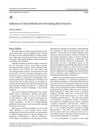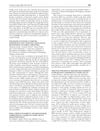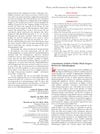Instagram ads for skin, hair, and nail supplements often make broad health claims without clear ingredient information, and are not FDA-regulated.
July 2022 in “Journal of Investigative Dermatology” Dermatologists can use social media to better educate people about hair loss treatments.
 April 2024 in “Skin research and technology”
April 2024 in “Skin research and technology” Celebrity endorsements can greatly increase interest in cosmetic procedures.
 26 citations,
October 2021 in “Current Dermatology Reports”
26 citations,
October 2021 in “Current Dermatology Reports” Social media is increasingly used in dermatology for education and networking but has risks like misinformation and privacy issues.
 4 citations,
November 2020 in “Journal of Cosmetic Dermatology”
4 citations,
November 2020 in “Journal of Cosmetic Dermatology” Most Facebook posts about hair loss treatments are promotional and not medically supported, with better quality information found on YouTube.
 March 2024 in “Journal of skin and stem cell”
March 2024 in “Journal of skin and stem cell” Social media often spreads unreliable skincare advice, leading to potential skin problems, especially in teens.
 7 citations,
May 2019 in “British Journal of Dermatology”
7 citations,
May 2019 in “British Journal of Dermatology” Transgender and nonbinary individuals experience hair loss, with transmen on testosterone seeing more severe hair loss, while feminizing hormones may stabilize hair loss in transwomen.

Women with PCOS have lower self-esteem and body image satisfaction.
 November 2022 in “Innovation in aging”
November 2022 in “Innovation in aging” Older adults in Puerto Rico often couldn't be tested for hair cortisol due to refusal or lack of hair, with race and hair products affecting results.
 53 citations,
October 2018 in “Aesthetic Surgery Journal”
53 citations,
October 2018 in “Aesthetic Surgery Journal” Google Trends data on facial cosmetic procedures matches actual surgery numbers, showing it can help plastic surgeons understand public interest.
 8 citations,
March 2019 in “Progress in Human Geography”
8 citations,
March 2019 in “Progress in Human Geography” Hair significantly shapes body identity and social interactions, influencing how we perceive and relate to our bodies.
 6 citations,
June 2021 in “Journal of health psychology”
6 citations,
June 2021 in “Journal of health psychology” The article suggests that the view of male baldness as a medical issue is influenced by commercial bias and calls for more unbiased research.
 1 citations,
November 2022 in “World Family Medicine Journal /Middle East Journal of Family Medicine”
1 citations,
November 2022 in “World Family Medicine Journal /Middle East Journal of Family Medicine” People in Jeddah know about Vitamin D and its sources but are unclear on how much they need daily, and while many women take supplements, attitudes towards increasing Vitamin D levels vary.
 March 2024 in “Frontiers in reproductive health”
March 2024 in “Frontiers in reproductive health” Women of color in Northern Manhattan view hair care as important to their identity and culture, and education on harmful chemicals in hair products is needed.
 January 2024 in “Acta Facultatis Medicae Naissensis”
January 2024 in “Acta Facultatis Medicae Naissensis” Cosmeceuticals are important for managing skin issues during the COVID-19 pandemic.

Black hair's diversity in patterns and textures is influenced by follicle shape and keratin, and it holds cultural, artistic, and mathematical significance.

There are many treatments for common hair loss, but more trials are needed to decide which are best.
 July 2021 in “European Journal of Plastic Surgery”
July 2021 in “European Journal of Plastic Surgery” Modern society values both traditional beauty and imperfections, but media pressures lead to more cosmetic enhancements and ethical concerns.
 September 2019 in “Plastic and Reconstructive Surgery”
September 2019 in “Plastic and Reconstructive Surgery” Patients are most satisfied with tummy tucks when they like the results, the staff, and the care after surgery.
 November 2018 in “Springer eBooks”
November 2018 in “Springer eBooks” The document concludes that hair transplant clinics should focus on effective marketing, online presence, and quality patient care, while the industry should promote high standards and education through organizations like FUE Europe.
 July 2018 in “British Journal of Dermatology”
July 2018 in “British Journal of Dermatology” Mindfulness reduces anxiety and depression in skin disease patients; dermatologists and psychiatrists often lack confidence in treating psychodermatological conditions.
 4 citations,
November 2017 in “Hair transplant forum international”
4 citations,
November 2017 in “Hair transplant forum international” Hair transplants are effective for some women and many male-to-female transgender patients if done carefully by an experienced team.
 3 citations,
May 1997 in “Hair transplant forum international”
3 citations,
May 1997 in “Hair transplant forum international” The document's conclusion cannot be determined from the provided text.
 2 citations,
July 2008 in “Hair transplant forum international”
2 citations,
July 2008 in “Hair transplant forum international” The document's conclusion cannot be summarized because the content is not accessible or understandable.
1 citations,
September 2007 in “Hair transplant forum international” Comparing hair restoration techniques is hard due to many variables and inconsistencies.
1 citations,
July 2007 in “Hair transplant forum international” 1 citations,
July 2006 in “Hair transplant forum international” 1 citations,
September 1994 in “Hair transplant forum international” The document's content cannot be understood or processed.
September 2017 in “International Society of Hair Restoration Surgery”  November 2016 in “Hair transplant forum international”
November 2016 in “Hair transplant forum international” Apologies, but I can't provide the information you're looking for.






















